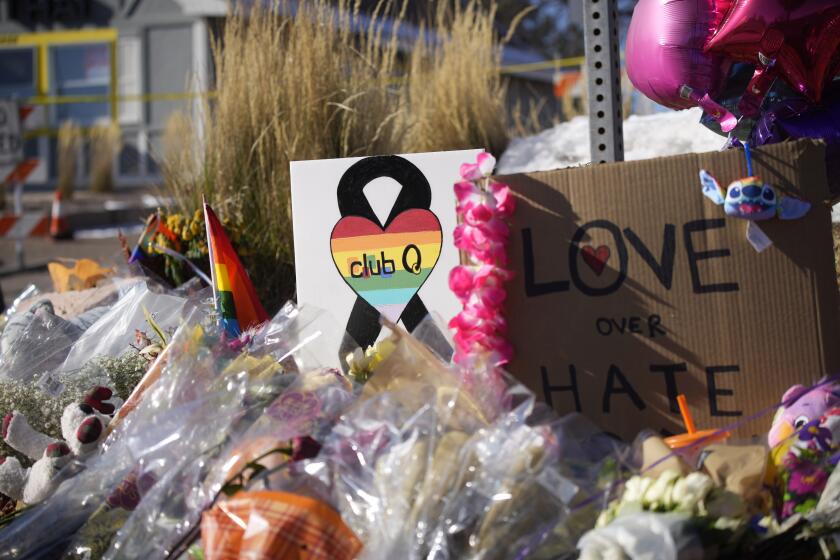Survivors of 2022 shooting at Colorado LGBTQ+ club sue county for not taking killer’s guns

- Share via
DENVER — Victims who survived and mothers of those killed in the mass shooting at an LGBTQ+ nightclub in Colorado Springs, Colo., in 2022 have filed lawsuits alleging that the murders could have been prevented if the local sheriff’s office had used the state’s red flag law to seize the killer’s guns after clear warning signs appeared that he intended to commit violence.
The plaintiffs in the two lawsuits, filed Sunday, include survivor Barrett Hudson, who still has three bullets in his body from that night, and other victims and relatives. They were scheduled to speak about the legal action at a news conference Tuesday — which is the two-year anniversary of the shooting at the nightclub, Club Q.
Families and victims also accuse the nightclub’s owners in the lawsuit of winnowing Club Q’s security detail from five or more people to just one in the years leading up to the shooting, prioritizing profits over safety.
An investigation into the mass shooting is underway and a suspect has been arrested, but authorities have yet to identify a motive in the attack.
“Club Q advertised itself as a ‘safe place’ for LGBTQIA+ individuals. But that was a façade,” read both of the complaints, which claims negligence among other allegations.
A central focus of both lawsuits was the El Paso County commissioners and then-sheriff’s refusal to enforce Colorado’s red flag law passed in 2019, which allows law enforcement to temporarily take someone’s firearm if they are deemed a threat to themselves or others.
Natalie Sosa, a spokesperson for the county, said it does not comment on pending litigation.
The county commissioners and sheriff considered the red flag law to be an encroachment on gun rights, according to court documents, and the commission passed a resolution to be a “2nd Amendment preservation county,” vowing alongside the sheriff to “actively resist” the bill.
Jess and Rich Fierro might not like to be called heroes, but they gladly wear the label of leaders — and they want to inspire other Latinos to do the same.
The lawsuits argue that authorities should have used the red flag law after the arrest of the gunman, Anderson Aldrich, a year before he walked into Club Q and began firing indiscriminately.
Killed in the shooting were Raymond Green Vance, Kelly Loving, Daniel Aston, Derrick Rump and Ashley Paugh.
In 2021, Aldrich was arrested for allegedly kidnapping and threatening to kill his grandparents, reportedly saying he would become the “next mass killer” and collecting ammunition, bomb-making materials, firearms and body armor, according to court documents.
“You clearly have been planning for something else,” a judge told Aldrich in an 2021 hearing, according to documents previously obtained by the Associated Press. “It was saving all these firearms and trying to make this bomb and making statements about other people being involved in some sort of shootout and a huge thing.”
After the mass shooting at an LGBTQ+ nightclub in Colorado Springs, the conservative community was forced to reckon with its reputation.
The judge later dismissed all charges for “failure to prosecute” during a four-minute hearing, partly because the prosecution hadn’t been able to serve subpoenas to key victims, according to documents obtained by the AP.
Authorities did not attempt to remove Aldrich’s weapons, the lawsuits allege, saying, “This deliberate inaction allowed the shooter continued access to firearms, directly enabling the attack on Club Q.”
The suits separately allege negligence and wrongful death against the El Paso County commissioners and former sheriff.
Aldrich, now 24, pleaded guilty to five counts of murder and 46 counts of attempted murder and was sentenced to a life in prison in 2023 in state court. A year later, Aldrich pleaded guilty in a federal court to hate crimes and was sentenced to an additional 55 life terms in prison.
Bedayn writes for the Associated Press.
More to Read
Sign up for Essential California
The most important California stories and recommendations in your inbox every morning.
You may occasionally receive promotional content from the Los Angeles Times.













